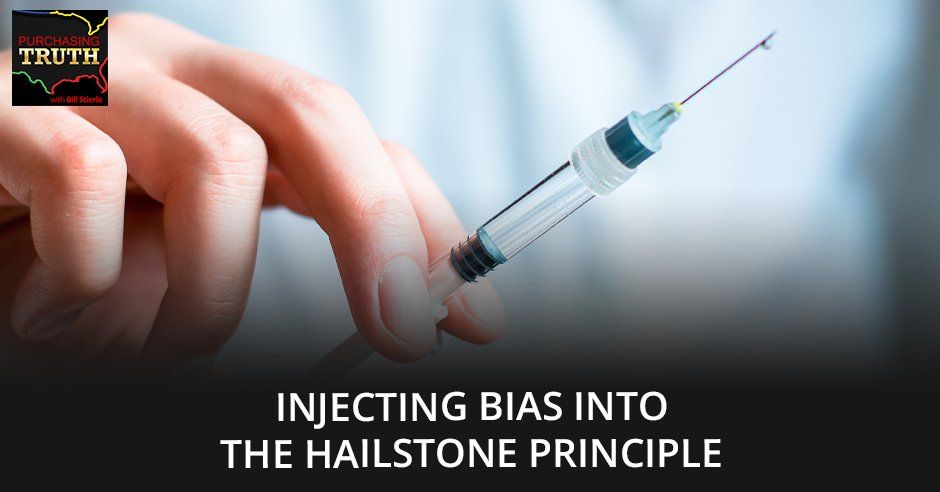Injecting Bias Into The Hailstone Principle
Subscribe Today!
The previous episode of "Purchasing Truth" taught us how something as small as a speck of dust can expand out of all proportion and become a big, powerful communication hailstone. This is especially true when it comes to the words we speak, particularly when they come from the mouths of influential people. As if things can't get even more out of hand, try injecting some bias into that messaging hailstone, and you'll see how great much trouble it can create. In this episode, Bill Stierle and Tom tackle the relationship between the hailstone principle and bias. They discuss it in relation to the Derek Chauvin Trial and the communication mess that happened after Representative Maxine Waters talked to reporters about the event. Learn the weight our words hold as they get passed on to others and then they inject their own meaning into them.
---
Watch the episode here
Bill, we talked about the hailstone principle last time. We have a lot to try to talk about because what we've discovered in preparing for this show is that there's also quite a healthy dose of bias that can get injected into the hailstone principle and impact it. We're talking about the Derek Chauvin trial over the accused murder of George Floyd. The case is in the jury's hands. Final arguments happened. Representative Maxine Waters went to Minnesota. She's from California to be clear. She's not from Minnesota but went to California in solidary with the protestors hoping for a guilty verdict and made some statements that then were discussed in the courtroom. What a communication mess this is appearing to be.
It is a communication mess. As our readers may have read in the past, the hailstone principle is when you take a little speck of dust, you coat it with a little bit of water, you blow it up into the upper atmosphere, and it freezes. They calm down, it warms, it gets more water, and it freezes again until it's this big hailstone the size of a softball. This is not a good thing. One of the biggest challenges that we have, both in politics, business, and our personal life, is to make sure that our messages do not get wind underneath and be taken the wrong way to treat them with a great deal of observation, compassion, and empathy versus start putting the layers of judgment, criticism, defensiveness, contempt, and withdraw on top.
That's the layers of language that are currently being put on top of a comment. We can have a discussion about how words can be taken the wrong way, because clearly, what is the wrong way mean? It means that there is a bias, fallacy, point of view, or belief that the person is saying, “This is my belief. I'm fighting for this belief.” You said this. It means that it is a confrontation. It means that is my interpretation is the word confrontation. That's the one that Maxine Waters put in the middle of this. “Stay on the street and be confrontational.”
Our bias, belief structure, and identity want to support the people on our team and in agreement with our value sets.
Make your voices heard and get more confrontational was the last part she said which from a language and messaging perspective is being amplified.
We listened to the whole clip. Inside the context, her voice tone was level 4, level 5, maybe level 6 at best. She was not standing at a podium yelling, “Do this. You've got to fight for this,” to a crowd ready to fight. She was to a reporter says, “What should the people do if the verdict does not go their way? Stay in the street and be confrontational.” It’s unsettling because it gets more confrontational becomes the speck of dust in the middle of a hailstorm that people are going to focus on. See how we're nitpicking this. As soon as we start cutting it up here a little bit, it almost loses energy. It's the word more and the word confrontational or trial by combat. That's Rudy Giuliani's phrase. Is combat more violent than confrontational? It has a little bit more weight to it. The word combat means something a little bit more specific. Confrontational is a little bit less than that. The tone is important. He was a level 8 or 9 in his delivery. If you look at her tone, which is a little more 5 and 6. There was a lot of other words around it.
Maxine Waters was asked about the trial and what she was doing there in Minnesota. She was talking about, “As a black community, we need to continue to stand up. We need to stay on the streets. We need to continue to fight.” She was talking to a collection of different media outlets with microphones. At first, her statement didn't even mention the word confrontational. Talk it much like John Lewis would have said in the past, “You got to get in some good trouble right and make your voices heard.” The media continued to press her. They were looking for the soundbite. I'm not trying to justify what she said, but if you look at the video and see the context, she said, “We're looking for a guilty verdict. We want to see him convicted of murder. He's guilty of first-degree murder, although he's only charged with second-degree murder. We want to see a guilty verdict of murder.” The media then presses her and says, “What do you think is going to happen if he is not found guilty?” She says, “We need to get more confrontational.” It was one thing that she said in response to that.
It was within three sentences though. There was an explanation around it. Our bias, our point of view, our intention with this communication show is to get it to be where we can look at communication from an observational place. Most people don't have the courage to have this conversation that you and I are having right now. How do you take language and use it to benefit us as human beings? How do we take it to have a discussion on the best thing to say and the thing that is not a good thing to say? Be honest about that was not something that served the message. Probably Kevin McCarthy, the Minority Leader, will likely try to force a House vote to center Maxine Waters. If you think about centering, certain comments, and phrases, does it rise to that thing? For some people, because one side said, it should be centered because the other side said, they get a pass.
Your side gave your side a pass. We're going to give our person a pass. We're going to make an exception for this language because it doesn't rise to the level of centering. The only problem we have is that there's a lot of things that are not arising to the level of centering and punishment or even impeachment. You can have an entire trial about something that you would like to know. People are not supposed to say or do things in that way, no matter how many votes they got. They're not supposed to say and do things like that. That is not something that is healthy for the nation and civil dialogue. That's the thing that, communication-wise, we want to keep in the front of our consciousness, because otherwise, we are getting into the place where we're not advocating for our highest values.
Does it make sense then is that if she says you need to be heard? Whatever it takes, stay on the street to be heard. Make your voices rise, be persistent, and stay on the street. That's the replacement for more confrontational. If a person's used to saying confrontational things and they blurred out another confrontational thing, do we do, “That is Maxine Waters. That's just Donald Trump. That's Mitch McConnell. That's Ted Cruz. That is Nancy Pelosi?” Do we move to a place of acceptance that they don't have the languaging skills?
We can agree that many of them don't have the languaging skills or don't take the time to consider their words enough and have the self-awareness that it would be nice if they had so they don't step on a landmine and self-inflict a wound either on themselves or their cause. Often, they clearly don't have the skills and the self-awareness to do that. How unfortunate is it? As a communication show, we have to acknowledge that there is some similarity between a poor choice of words, then that little soundbite about we need to get more confrontational without the rest of the context that led up to it, without the context of the tone, and she's having a civil conversation because she's not yelling. She's not standing from a podium. She is speaking about at the level I am right now in a group of reporters who are asking her questions.
We have to acknowledge that the words are going to move people to action regardless, in some ways.
CLICK TO TWEET
This is where it’s tough because our bias, belief structure, and identity want to support the people on our team and in agreement with our value sets. It’s challenging to realize how sensitive human beings are to the word, tones, and phrase them. The whole thing about the hailstone principle is it escape air, you blowing it up, and you put it up there, it becomes bigger and it becomes a thing where it's not a thing.
What's shocking here is that the judge in the Derek Chauvin trial over the death of George Floyd blew air underneath this speck of dust and shot it up into the atmosphere to make it a bigger hailstone, which is in and of itself pretty shocking. It depends on your perspective, but surprising, maybe disheartening. A judge is supposed to be neutral in this. The defense attorney brought it up after closing arguments in the courtroom. We don't think the jury was present when the statements were made so it would not have biased the jury as long as they're not able to see the news. The defense attorney brought it up and the judge made a comment that is completely inappropriate of a judge.
Even though the jury is out of the room and I'm sure he's going to say, “Based on the Letter of the Law civil justice procedure, and criminal justice procedure, I didn't do anything that was going to taint the jury when I made this comment.” He is on camera. What he's saying is being broadcast to the nation. He said to the defense attorney, “Representative Maxine Waters may have handed you grounds for an appeal.” Maxine Waters’ comments may have handed the defense grounds for an appeal. That communicates to the world that the judge thinks what Maxine Waters said was over the line, inappropriate, not helpful, and somehow potentially taints this entire trial.
The hard part about that message is that when somebody has a bias and a belief structure and an identity that's in favor of one point of view or another. The brain is looking for something to validate its truth. Not the truth. I'm looking for something so this thing that's taking place is not so painful to me. I don't have to question the bigger picture. All I need to do is focus on the get-out-of-jail-free card, the thing that makes my bias and belief to stay in place. I do not have to re-question my belief. Regrettably, it's more about what the brain is looking for. It does take a bit to stay in a place of observation instead of allowing our beliefs and our biases to influence us. The judge is saying and it may have legal accuracy, but it is not something in this place and time to mention.
I'm always the first to say hope is not a strategy and hope is not a plan, but I would hope that a judge who is experienced at being a judge would know better than to stay away from making such an unnecessary comment in their own courtroom. The defense attorney is going to make all kinds of statements and the judge can say, “Are you making a motion? Are you asking me to act on anything or not? No? Time to move on.” Not make a comment like that isn't material to what's going on in the courtroom. The judge revealed his own bias. He's given people that are on the team of the police officer and not on the team of the black community here or whatever team they're on. He gave people something to cling to and has now inflamed that soundbite for Maxine Waters to be something more than it was meant to be.
People look at the phrase and strip away the context from it. It's one thing to have something that's planned in order to rally a group up and to say violent things versus someone walking down the street and saying, “This is what my opinion is with your question.”
She's still in that context. She needs to realize that her words matter, people are going to listen to her, rally, and may decide to be more confrontational because of what she said. I agree with you. There's a difference. As you said, it was maybe level 4 or 5 on the scale of spoken language and violence. We have to acknowledge, as you did before, that there is some similarity to what was said in Washington, DC on January 6, 2021 but there is a difference. Rudy Giuliani was one of many speakers. He used trial by combat. President Donald Trump from the podium in a plan speech that was planned and amplified. They wanted people to come to the Capitol to help stop the certification of votes where he's saying, “You've got a fight like hell or you're not going to have a country anymore.” That's a level 8, 9, 10 inflammatory statement to call people to action, which when you look at the context of what Maxine Waters said, it's clearly not the same thing but we have to acknowledge that the words are going to move people to action regardless, in some ways.
It depends if it's in the circle of influence or if you have a camera in front of you, which we all do. You can't walk down the street without getting your picture taken by somebody's cell phone. Somebody can look out the window and take a picture. That’s how accessible and put it out to the world instantly. This is why the hailstone principle is important here. You could walk by, picking up a piece of trash, throw it in the neighbor's trash can off the street, and the neighbor can say, “Stop putting trash in my can.” You’ll be like, “I'm cleaning the street here.”
Where does our bias and our perspective look to the worst of what someone's saying versus the best of what somebody is saying, and then also paying attention to what truth looks regarding voting or the death of a person? This is big stuff. This is a talk that's not going to go away. I appreciate our readers for hanging with this one because this one's a little tough because you got to stay, look, keep your mind in a place of observation, and be compassionate for the loss of life and also the fight for a person's identity which is much a part of a person's bias.
Bill, I appreciate that. This is a great example of the hailstone principle. I also liked that we're not taking too deep a dive in it because there's a lot more to come on this. Even by the time this show publishes, the verdict will have happened in this trial. There's going to be a lot more to talk about. We can pause it until then. I look forward to continuing that conversation. Thanks, Bill.
Thanks, Tom.
Love the show? Subscribe, rate, review, and share!






